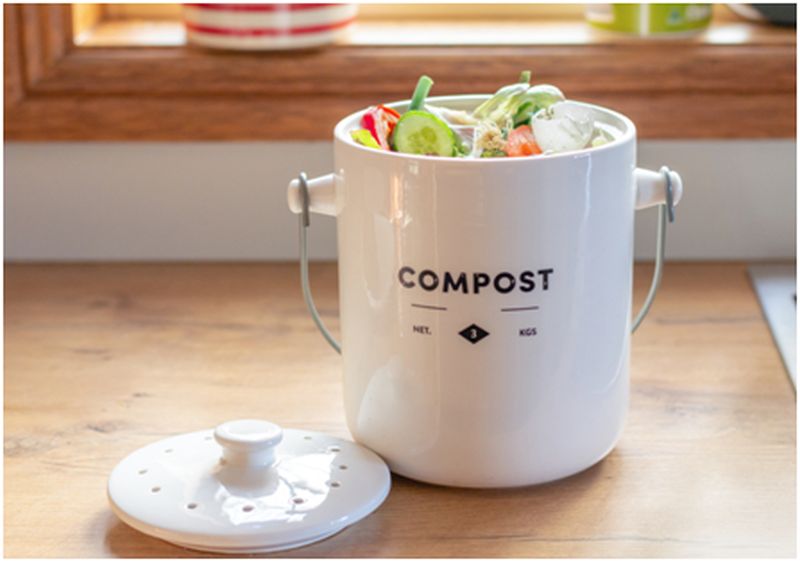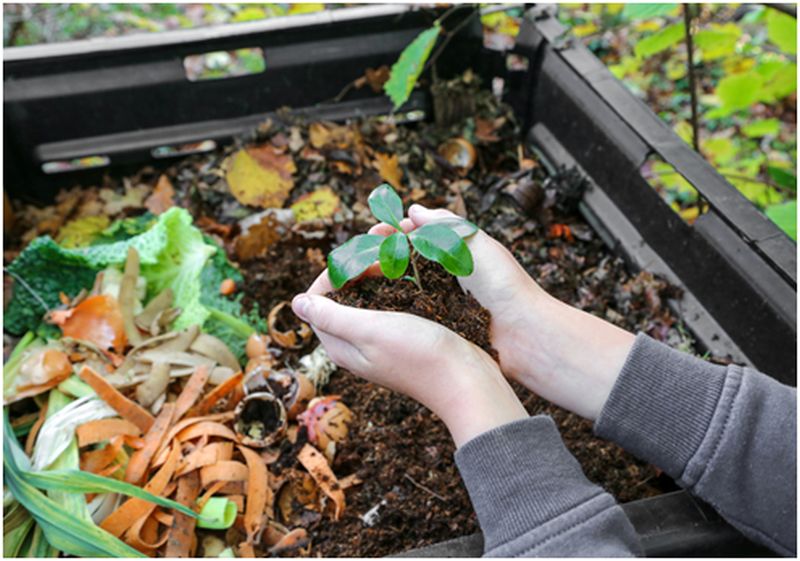If you’ve been searching for ways to be more sustainable or green in your lifestyle, then you might have heard about composting. For many, composting seems like a major challenge. Unlike other simple green-living solutions, such as wearing sustainable rings made from recycled materials, composting takes time and effort. What can you compost? How bad will it smell? What even is the purpose of compost? Here are the answers to your questions, plus some tips on getting started! Composting beginners, this one’s for you.
What Is Composting?
Simply put, composting is when you use the scraps from food items to create nutrients for growing plants. Think of it as the recycling of gardening! Otherwise known as organic plant fertilizer, composting can have a variety of benefits to your garden. Whether you’re creating a garden of fresh fruits and veggies in your backyard or you’re helping out in the neighborhood community garden, composting can give your gardening the “oomph” it needs to produce better greens.
Who Can Compost?
Anyone can compost! If you’ve got a container and food scraps, then you’re well on your way to composting. Composting isn’t limited to one group of people or another. No matter whether you live in the middle of nowhere or you’re surrounded by skyscrapers, composting is something everyone can do. Since composting is so accessible, it can easily become one of the main ways you orchestrate your sustainable living choices.
There are several methods of composting that can suit a wide variety of lifestyles and living situations. One of the most common methods is backyard composting, which involves creating a pile of organic matter in a designated area of your yard. This can be done using materials such as leaves, grass clippings, and food scraps, and over time the materials will break down into rich, nutrient-dense soil. If you live in an apartment or have limited outdoor space, you can use a worm composting system which involves a container filled with bedding material and worms, which will eat and break down your food scraps into compost. Worm composting systems can be kept indoors and are often small enough to fit under a sink or in a closet.
What Are the Benefits of Composting?

There are a variety of benefits of composting. When gardening, loose soil can lose vital nutrients during storms and other natural disasters. Even strong gusts of wind can pull away soil and earth plants need to survive! Composting helps to provide a dense layer that keeps soil in its place, preventing erosion. Since compost is made up of materials that absorb water, it’s also great at conserving water. This is ideal for climates that struggle with using too much water, such as desert areas. Plus, it helps to filter pollutants in the air. This is perfect for urban areas, especially ones that have large areas of highway or roadway.
Some other benefits of composting include:
- Cost efficiency: Composting is cost-efficient in the long run. Because it acts as a natural fertilizer, you can grow vegetables and fruit right in your backyard, preventing you from spending extra on produce from the store. Plus, you won’t have to spend money on consumer-grade fertilizer.
Source: Evan Lorne/Shutterstock.com
- Flood reduction: Growing grass, fruits and vegetables with compost helps to reduce floods. Because the compost absorbs the water, it can help to manage stormwater in a way that reduces the amount of water pooling on the ground. Instead, the soil absorbs the water. If you’ve ever driven by a field that has water pooled in the middle of it, basically destroying the crop, then you know just how important natural fertilizer like compost can be.
- Healthier plants: Plants grown with fertilizer are typically much healthier than plants that aren’t. This is especially due to all the natural ingredients and chemicals found in compost. For many, healthier plants lead to better-tasting produce, reductions in the amounts of plants that suffer from plant diseases and tons more. Without compost, plants don’t thrive.
What Can I Compost?

That’s a great question! Composting the right items is essential, especially for beginners. Here are some of the most common items to include in your compost:
- Grass or brush: It’s always a good idea to use the leftovers from cut grass or brush. When you’ve mowed the lawn, collect the scraps and use them in your compost. Using dead plants in your compost is part of what makes it so beneficial for growing ones.
- Old fruits and veggies: Whether you use banana peels or cranberries, you can give old fruits and veggies new life by incorporating them into your compost. Since they’re made from the ingredients you’re growing, it’ll help to keep the fertilizer ripe with the best nutrients for your soil.
- Shredded paper: Shredded paper is a great ingredient for compost. Since it doesn’t break down as fast as other organic material, shredded paper is something you can add a bit of at a time. If you choose to use it as your base, make sure you include lots of old fruits and veggies or other items that do break down faster.
- Coffee grounds: Have you ever felt odd about throwing out all your old coffee grounds? Maybe you’re the type of person who sets them aside and forgets to get rid of them. You can use old coffee grounds — and even the paper filters! — in your compost. Considering how many people drink coffee, it’s a no-brainer ingredient for composting.
What Other Things Should I Know About Composting?
Here are a few other things to note about composting, especially for beginners:
- Be prepared for the smell. It’s true — there’s definitely a scent when you compost. And, it might seem pungent for a while. However, the smell is a small price to pay when you consider all the benefits of composting.
- Don’t be afraid of getting your hands dirty. Composting is just like gardening — you’re gonna get dirty. Ditch the metal jewelry and opt for hassle-free silicone rings, wear gloves and don’t forget to wear an apron or clothes you aren’t worried about. This way, when you compost or spend any time outside, your composting experience will be much better.
- Avoid bones and dairy products. Animal byproducts, such as butter and bones, aren’t compostable. Avoid using them in your compost. Otherwise, you run the risk of damaging your plants and attracting pests. If you’ve invested a lot of your time in your garden, you’ll want to do everything you can to keep it thriving, especially with compost.
Composting is a great way to continue on a path of sustainability. Even if you’re new to the idea of composting, there are plenty of things you can do to get started.
Article Submitted By Community Writer




